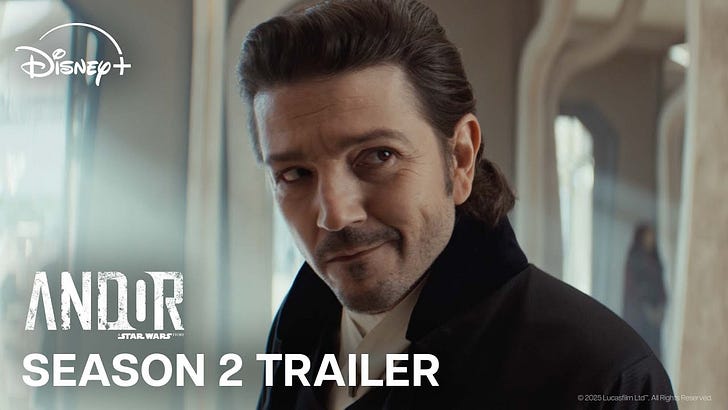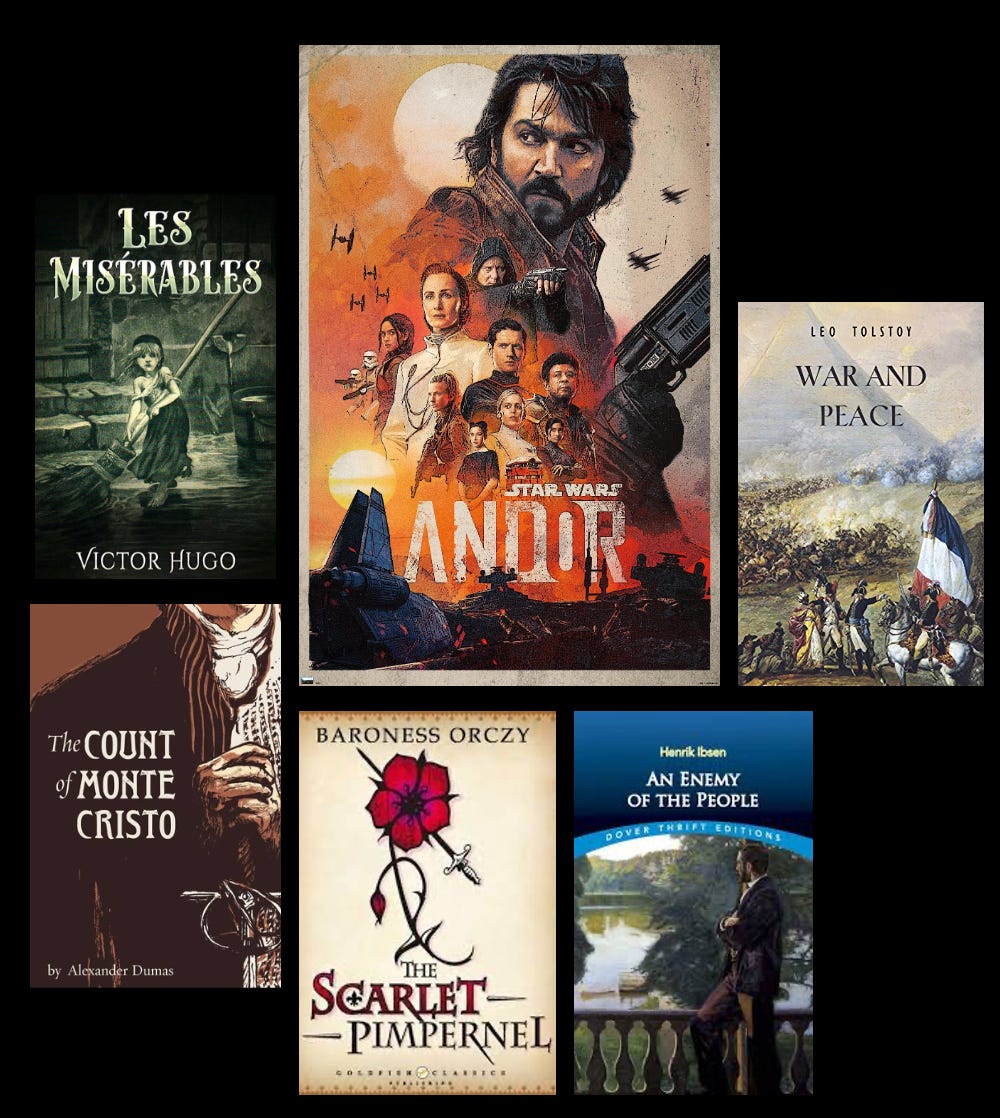'Andor' and 19th Century Literature
The thrilling trailer of 'Andor' Season Two dropped yesterday, but it doesn't capture what I love about this show
The new trailer for ‘Andor’ dropped yesterday, and it’s got me excited for the second (and final) season of one of my favorite shows ever. The trailer is filled with invigorating action interspersed with critic’s glowing praise, all while buttressed by a fiery song! But, funnily enough, this trailer does not capture what I love about this show. And if I were to recommend this show to you, I would not do it on the merits of this trailer.
(I still encourage you to check it out, though!)
So, how would I recommend this show to someone who has not seen it before?
How would I get you excited to go back and watch season one in preparation for season two?
In short, my pitch is that Andor is, for me, the closest thing to 19th century literature that I’ve seen created in my lifetime.
If that is enough motivation for you, please go check out the show and come back to this article. But if you’re not quite sure what I’m getting at, then please read on! There are no explicit spoilers (except for Star Wars: A New Hope), but there is my more meta-interpretation of what I think this show is getting across, and if you’d like to experience it freshly, I recommend watching through episode four of Season 1. (I wasn’t sold on the story through three episodes, but episode four got me, and episode six made me a true believer.)
Okay, first off, a little bit about myself to indicate how and why Andor Season 1 hit me so hard.
I live a dual literary life. During the day, I read and teach classic fiction. (Right now I’m reading Crime and Punishment with my High School students, and I’m about to start Victor Hugo’s Ninety-Three with my Junior High students.) During my weekdays, I’m immersed in 19th century literature. During my evenings, I enjoy watching our modern-day “novels”: prestige Television. Right now I’m watching, ironically, the show Severance. Over the years, I’ve loved shows like Mad Men, Game of Thrones, The Wire, Succession, and Better Call Saul. For all the love I have for these shows, they are, for me, a fundamentally different experience than the 19th century novels and plays I enjoy reaching and teaching.
So, where does Andor fit in here?
Well, it wasn’t till watching Andor S1, that I felt like my two literary worlds converged; like I was watching a modern, “prestige”, tv show that I could just as well be teaching in my literature classes featuring works like Les Miserables, The Scarlet Pimpernel, The Wild Duck, and The Count of Monte Cristo.
If you are not at all familiar with Andor, it is indeed in the Star Wars universe. But I see something fundamentally different in the kind of story that the original Star Wars tells (as well as its subsequent sequels and tv shows) and the kind of story Andor tells. Star Wars is modern-day mythology building on archetypes and telling elemental stories. Luke’s story is akin to the stories of Perseus, or Aeneas, or countless other Joseph Campbell-esque heroes. It's a fairytale set in a galaxy far far away, and I love it! I’ve watched Luke Skywalker take on Darth Vader so many times! And I’ve burst in excited relief so many times when, in A New Hope, Han Solo appears out of nowhere and saves Luke’s life to help him destroy the Death Star because Han has had a change of heart.
Andor, is not the grand hero’s journey. The focus is not on the elemental themes, archetypal characters, and mythic stories. Rather, it delves into the complexity of moral choice, into the psychology of sympathetic heros facing impossible choices and sympathetic villains trying to do what they believe is right. It takes the story of Han Solo in A New Hope—the story of a scoundrel who goes from cynical pragmatist to true believer (in a sudden twist)—and turns that late plot-twist into twelve episodes of character development. The story of Cassian Andor is more like the long-developing story of Jean Valjean in Les Misérables than the quick, off-screen change of heart of Han Solo.
Now, you may say, “Luc! Well-drawn characters, intricate plots, complex ideas: that sounds like most prestige TV out there! So, how is Andor different?”
Allow me first to show what elements of Andor make me feel like I’m reading my favorite 19th c. novels or plays.
1) Inextricable Plot Development Driven by Characters Choices – The driving force of the story is the choices of the main character. Each choice leads to ever-greater conflicts, some clearly expected, and many surprisingly unexpected, but all absolutely, logically necessary. The conflicts for Cassian grow and grow, and like a good Ibsen play, his choices lead to organically spreading consequences which redound on him with doubled force. (I feel like I’m reading The Hunchback of Notre Dame or Ghosts where characters’ good intentions lead, inexorably, to terrible consequences that they have to face.) And it all builds to the absolutely logical, and therefore, powerful climax. When the final scene comes, my feeling was, “Whoah! But, yes, it had to happen like this!” That feeling of surprise, yet inevitability, is one things I cherish from authors like Rostand, Ibsen, and Hugo.
2) Characters with Conscious Purpose – I love and care for all the characters! They are more than complex or well-drawn; they each have a conscious understanding of their motives. They are characters who have principles, and act on them. They know that to take hold of their lives means to understand the philosophical underpinnings of their actions. But they don’t go around preaching, rather, at key dramatic moments, they make their case with the most eloquent declarations. I love it, in The Count of Monte Cristo, when Edmond Dantes articulates his metaphysical motivation for becoming The Count; or, in Les Misérables, when Inspector Javert expresses his deeply philosophical (and flawed) view of justice; or, in Crime and Punishment, when Raskolnikov elucidates the moral principles that led to his heinous actions. The characters in Andor—like Luthen, Dedra, Cyril, Mon Mothma, or even minor ones like Kino, Skeen, and Nemik—are not at the mercy of forces beyond their control. They all have their own clear and deep motivations (or try to learn). As one character explains, “Everyone has their own rebellion.”
3) Theme That is Both Epic and Insightful – Star Wars has epic, mythic themes like Good vs. Evil. And Andor exists in the metaphysical universe where that Good vs. Evil exists. But Andor seeks to answer more complex questions, and does so with intriguingly original answers. When I read Ibsen’s Lady From The Sea, I come away thinking, “Yes, that is a truth that I hadn’t considered before.” And that is the kind of unique thematic insight that I experience over and over again in works like Frankenstein or Crime and Punishment or An Enemy of the People. And Andor does that for me. For me, the central question of the show is, how does “Han Solo”, the scoundrel, become “Han Solo”, the rebel general? And the answers given are minor revelations to me! The answers have helped me, not only to understand the character of Cassian, but to see how I might shape my own soul. And the theme is repeated throughout the story’s multiple plot-lines. It’s not a tacked-on idea. It is integral to the web of plots. And just as Cassian’s conflicts expand to galactic conflicts, so the driving thematic question goes from, “How does a complacent scoundrel become a rebel diehard?” to “How does a complacent society start to revolt?” And the answers felt deeply illuminating to my own life.
I’ve enjoyed intricate plots, rich characters, and insightful themes in contemporary prestige television, but never on the integrated scale of Andor. I’ve loved the characterization and dialogue in Mad Men, but I don’t have the same sense of a propulsive plot. I’ve loved the epic story, interesting characters, and dramatic scenes in Game of Thrones, but I’ve felt like I’m on a thematic hamster wheel as the story meanders along (“love is the death of duty” rotating over and over). And I’ve enjoyed the complexity of story in The Wire, but I feel like each character is at the mercy of their demons or the system’s demons. Andor is, the most integrated work in theme, plot, and characterization of any tv show I’ve seen.
But there is one more thing that makes me feel like I’m living in a 19th century novel when I watch Andor. It is the only contemporary “literary” experience that I’ve had where I’ve felt that human beings are in charge of their destiny, and can figure out how to take control of their lives. I don’t mean in a fantasy/superhero/mythological sense—that includes even Star Wars! But, rather, in a *real* sense. Whether for good or ill, characters guide the direction of their lives and it feels real. Prestige TV pulls back the veneer of fantasy, to see what is “real”, and what is beneath is not usually pleasant to look at. Andor, for me, peels back that fantasy veneer, and reveals the possibility of real optimism and real inspiration—the kind of feeling I get from living in a 19th c. novel.
So back to the trailer…
There will be explosions, action, emmy-worthy performances, complex ideas, but it’s not for those that I’m looking forward to S2. It’s because I see that spirit of the 19th Century that I cherish is springing forth from something new. And may that continue into Season Two!
After watching the trailer several times yesterday, I went back and listened to an interview with Tony Gilroy, the creator of Andor, and it heartened me to hear him say, that he was treating Andor (and got the freedom to treat Andor) like his big novel, like, as he suggested, his War and Peace.
A few practical tips for watching:
1) ‘Andor’ is on Disney+. Season 1 is available now, and Season 2 starts on April 22nd. So there’s time to catch up!
2) Season 2 is being released weekly in four batches of three episodes, from April 22nd through May 13th. So you could conceivably subscribe to Disney+ for just one month and catch all of Season 1 then all of Season 2.
3) As mentioned above, I was not hooked on ‘Andor’ till I was through episode four. The first three were not as compelling to me as what develops. So I recommend sticking through it at least through four, and through seven to get the full effect of what I describe above.
P.S. I know I’m kinda vague in my explanation of what I love about Andor—I’m not giving you examples from the story! Maybe I’ll write a follow-up where I’ll do spoiler-filled analysis, but, for now I’m hoping you’ll watch it and let me know what you think.







Thanks much for this Luc - I also enjoyed the logically building plot, the well-developed motivations of the characters, and the pressing moral questions in Andor S1, and am looking forward to S2. Please do write a "spoiler-filled analysis" - I would happily read it :)
What I love about Andor, beyond all the wonderful things you point out here, is that it shows a man discovering the value of freedom for himself. Like you say, it's not a sudden conversion - he has to live through tyranny up close and personal to get why fighting for freedom matters. It's an exceptional piece of television and it's an absolute marvel that Disney-era Star Wars produced such an outstanding show alongside a lot of very mediocre ones. I can't wait for season 2.